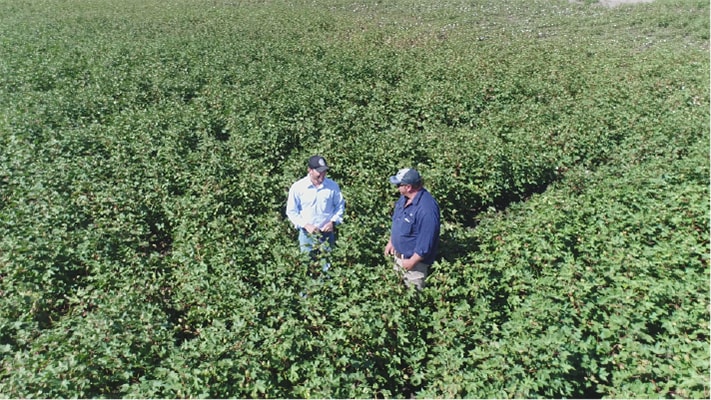New IWM research shows need for cotton industry collaboration to manage herbicide resistance
About
-
Category
- News
-
Date
16 September, 2019
About
Category
- News
Date
16 September, 2019

The success of glyphosate in Australian agricultural systems has driven this increasing pressure on the chemistry, resulting in increased glyphosate resistance.
Despite increasing levels of resistance, glyphosate continues to perform well in the Roundup Ready Flex® system, with 93 per cent of growers rating the level of weed control achieved as Excellent or Good.
Glyphosate is a critical herbicide for the cotton industry, and for agriculture in general, so protecting the longevity of the product is important.
Concern over herbicide resistance has prompted Bayer to initiate a program to help the cotton industry better understand glyphosate usage and integrated weed management (IWM).
“Over the last 20 years, over-reliance on glyphosate has seen a marked decrease in residual chemistry use within cotton systems and has also been a key contributor to the development of glyphosate resistance,” Bayer Brand Manager Kate Connors explains.
“In 2016, insights gathered from 200 farmers and consultants led to the development of several initiatives to assist cotton growers in implementing their on-farm IWM program.
Bayer now offers free herbicide resistance testing, the Roundup Ready PLUS® program, which rewards cotton growers who use herbicides sustainably, and the Mix It Up™ website, to help growers manage herbicide resistance.”
Bayer conducted further research in 2019 to understand any changes in prevalence of glyphosate resistant weeds and IWM practices.
The results of this research will enable Bayer to continue to refine programs to assist in managing resistance and promoting the longevity of the Roundup Ready Flex technology in Australia.
“While the problem of glyphosate resistance is significant, it is also manageable,” Kate explains.
“This project was fundamentally driven by a desire to influence positive change in on-farm use of glyphosate products and effective integrated weed management practices.”
Key findings from the 2019 research program:
- Glyphosate resistance is increasing
In 2019, 85% of growers surveyed suspect they have glyphosate resistant weeds on-farm, up from 74% in 2016. In each valley surveyed, the number of growers with glyphosate resistant weeds on farm has increased from the 2016 base.
- Fleabane, Feathertop Rhodes Grass and Annual Ryegrass are the biggest weed challenges
- Non-glyphosate herbicide resistance is increasing
Group J and K herbicides featured in the survey for the first time, showing growers’ increasing concern, particularly in controlling Fleabane, Annual Ryegrass (Group J) and Feathertop Rhodes Grass (Group K).
- Glyphosate continues to perform well in the Roundup Ready Flex system
93% of growers rated the level of weed control achieved as Excellent or Good.
- Growers use an average of 4.9 applications of glyphosate per cotton season
This equates to an average of;
- 1.9 applications during fallow (compared to 2.1 in 2016)
- 0.6 applications at sowing (compared to 0.5 in 2016); and
- 2.4 applications over-the-top of cotton (compared to 2.7 in 2016) -
Pre-emergent herbicide use is increasing
Since 2016, pre-emergent herbicide use has increased by 13%. This increase may be due to several factors, including Bayer’s Roundup Ready PLUS program, with an increase in the use of program herbicides.
- Cultural practices are being used to control surviving weeds
Growers are implementing cultural practices in-crop to manage surviving weeds. 84% of growers took action to control surviving weeds, the majority through inter-row cultivation (51%) and chipping (32%).
Bayer remains committed to helping growers manage weeds on farm, through a range of programs and tools. Visit www.roundupreadyplus.com.au for further details.
Full results from the 2019 research available for growers here.
Source: Bayer IWM research project, conducted July, 2019.


